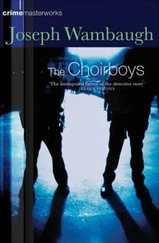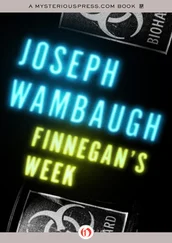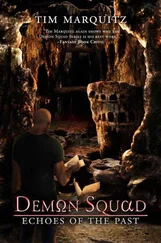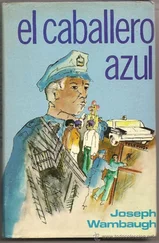Joseph Wambaugh - Echoes in the Darkness
Здесь есть возможность читать онлайн «Joseph Wambaugh - Echoes in the Darkness» весь текст электронной книги совершенно бесплатно (целиком полную версию без сокращений). В некоторых случаях можно слушать аудио, скачать через торрент в формате fb2 и присутствует краткое содержание. Жанр: Полицейский детектив, на английском языке. Описание произведения, (предисловие) а так же отзывы посетителей доступны на портале библиотеки ЛибКат.
- Название:Echoes in the Darkness
- Автор:
- Жанр:
- Год:неизвестен
- ISBN:нет данных
- Рейтинг книги:5 / 5. Голосов: 1
-
Избранное:Добавить в избранное
- Отзывы:
-
Ваша оценка:
- 100
- 1
- 2
- 3
- 4
- 5
Echoes in the Darkness: краткое содержание, описание и аннотация
Предлагаем к чтению аннотацию, описание, краткое содержание или предисловие (зависит от того, что написал сам автор книги «Echoes in the Darkness»). Если вы не нашли необходимую информацию о книге — напишите в комментариях, мы постараемся отыскать её.
Echoes in the Darkness — читать онлайн бесплатно полную книгу (весь текст) целиком
Ниже представлен текст книги, разбитый по страницам. Система сохранения места последней прочитанной страницы, позволяет с удобством читать онлайн бесплатно книгу «Echoes in the Darkness», без необходимости каждый раз заново искать на чём Вы остановились. Поставьте закладку, и сможете в любой момент перейти на страницу, на которой закончили чтение.
Интервал:
Закладка:
Bill Bradfield went off alone to make grief noises. When he returned he could only say, “A fellow poet has died!”
And that death set the stage for a maniacal tour of the sacred places. The disciple wanted relics . The four of them-Bill Bradfield, Sue Myers, and the two boys-careened around the Continent in a rented Volkswagen bus while he hungered to see every site where the bard had so much as walked.
They rattled into Rapallo where Pound had been arrested at the close of World War II for treasonable collaboration with the Fascists. They tracked down a former friend of the poet who still lived in the same house she had occupied as a child when she was Pounds neighbor. The woman couldn’t speak English but managed to understand Bill Bradfield’s Spanish.
She revealed to him a treasure trove. Her house was filled with books by and about Pound, and photos, and memorabilia. It was a day of joy!
They found a prison compound near Pisa and visited Ezra Pounds former cellblock as other pilgrims visit Lourdes. Bill Bradfield clipped a piece of the barbed wire that encircled the now defunct compound and treated that snippet like a sliver from the True Cross.
They met and lunched with the man who owned the property where the camp had been. Bill Bradfield assured him that his land would be very valuable, after Ezra Pound attained his rightful place in the world of letters. He advised the man to build a grand monument, a tribute to the poet.
But the simple Italian said, “My roses are a tribute. It is enough.”
Venice, of course, was a challenge. They went to every lodging, every restaurant, every bar that Ezra Pound had frequented.
She really worried in Austria, when they got to the very doors of a castle occupied by the poet’s daughter. But by now, Bill Bradfield had lost some of his heat. His blue eyes weren’t quite as bright, and after some urging, he agreed that Pound’s daughter wasn’t likely to receive two Pennsylvania schoolteachers and a couple of kids, even if he could convince her that he had known her old man back in Washington.
Sue Myers was thirty-two years old by then, and felt fifty when they finally arrived at a tiny Austrian town mentioned in The Cantos . The Austrian town had prospered during the Great Depression when its mayor had created and issued his own money. He dated the currency and decreed that it would depreciate in value each and every week it was not used; therefore, the money circulated and people traded vigorously for it.
Ezra Pound had immortalized the town as a tribute to Mussolini and he’d made the grandiose generalization that what worked on the village level could work on a national level. Indeed, on a global level.
At the entrance to the village there was a little bridge bearing a plaque written in German. Sue Myers was finally able to contribute something to the intellectual business at hand. She’d studied German in college and could translate.
Bill Bradfield was excited to discover that the plaque was a testimonial to the mayor whose economic brainstorm had saved the village. The daughter of the mayor was still alive, and thrilled him even further by giving him pieces of the old money to add to his collection of Pound memorabilia. She also graciously showed them her father’s library and it was just as Ezra Pound had described it! She even had an old photo of the poet holding a neighbor’s baby.
Well, that was about it. He had the rusty barbed wire, the dated money, and several other relics. Sue Myers had anemia and frazzled nerves and was being driven nuts by his bored teenagers.
She’d fought with the older boy relentlessly for ten months. The younger had a crush on her and that was almost as bad. Whenever they’d arrive in a new town, she’d slip them some lire or francs or pesetas and tell them to get lost until it was time to move on.
Bill Bradfield, after concocting the elaborate cover story to explain Sue Myers to his sons, had stuck to it. He was always reassuring them that she was nothing more than a colleague from the English department who happened to be going to Europe, and that they’d pooled their bucks. For a time the boys wanted to believe that two grownups could share the sleeping quarters in the Volkswagen bus while they slept outside in a tent.
Unfortunately, the younger son’s crush on Sue didn’t wane, and one day he found some birth control pills in her luggage. A years supply. He felt betrayed. Finally, he caught them in bed together in Granada, Spain.
“The boy never forgave me,” Sue recounted. “I’ve heard Bill Bradfield reminisce about every slight he’d suffered in his lifetime. He remembered every toy he didn’t get as a child. The Bradfields don’t forgive.”
And then she made a discovery: Bill Bradfield had letters awaiting him at various destinations. Letters from several women. After finding and reading them she knew that he’d been encouraging them all along the way.
She was heartbroken. There had been other affairs during their years together, but she thought that somehow when they returned from Europe it would be different.
“I hated springtime,” she always said. “He’d get so active.”
Sue Myers was certain she’d have a mental breakdown if she didn’t get home to the States. But now she knew that he’d be as active as before with all the cryptic notes, and a secret post office box, and ringing phones that went dead when she answered.
She vowed to get out. She wanted to be married and have children. Her kiddie clock was ticking in her ears.
As always, he begged forgiveness and made new promises. This time he pointed out that since he was a poet like Ezra Pound, his affairs were simply “grist” for his poetry. Upon their return from Europe, he proved his sincerity by moving into an apartment with her.
It seemed like a step closer to marriage. But Sue Myers later came to realize that she was pretty bad at basic math. In their years together he’d written just three poems, but he’d had thirteen relatively serious affairs, one poem for every 4.33 rounds of gristing.
2
She’d heard that the new principal had arrived at Upper Merion Senior High School, but where the devil was he? And who was the tall army officer roaming around the corridors in full uniform?
Ida Micucci had a whole lot of questions that went unanswered during the first days of Jay C. Smith’s tenure at Upper Merion, though one of them got answered pretty fast. The tall army officer was the new principal. Jay Smith was a staff officer in the U.S. Army Reserve, but why he felt he needed to wear his uniform to school on his first day was a mystery. It was probably the most innocuous of all the mysteries that would trouble the principals secretary from that day until her retirement.
It took a full week for the new principal to walk into her office and introduce himself.
“You’ve never seen such a pair of eyes in all your life,” she said often. “There was no feeling in them. You might think you’ve known a few people with cold fish eyes, but not like his.”
They were not fish eyes. They were eyes that newspaper editors in later years loved to isolate for effect. They were referred to as “reptilian,” but that was not correct either.
Jay Smith was tall, middle-aged, with receding dark hair, a weak knobby chin and a rubbery sensual mouth. He was not an attractive man. Some thought that Jay Smith looked like an obscene phone call.
Ida Micucci hated to admit that his eyes scared her, but then she was too busy disliking Jay Smith to be all that scared. For starters, no one could ever find the guy. He’d come to school and enter his office and vanish . When he’d eventually reappear after people went looking all over campus for him, he’d never apologize. He’d simply enter the office and tend to his paperwork. By late afternoon he’d lock his office door and refuse to come out.
Читать дальшеИнтервал:
Закладка:
Похожие книги на «Echoes in the Darkness»
Представляем Вашему вниманию похожие книги на «Echoes in the Darkness» списком для выбора. Мы отобрали схожую по названию и смыслу литературу в надежде предоставить читателям больше вариантов отыскать новые, интересные, ещё непрочитанные произведения.
Обсуждение, отзывы о книге «Echoes in the Darkness» и просто собственные мнения читателей. Оставьте ваши комментарии, напишите, что Вы думаете о произведении, его смысле или главных героях. Укажите что конкретно понравилось, а что нет, и почему Вы так считаете.












